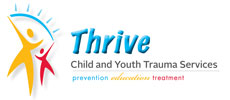Our Promises
Important information
Our Orientation Manual
The Orientation Manual is designed to provide an overview of essential information about accessing services at Thrive.
Content found in the Orientation Manual includes:
- Principles of service statements
- Thrive Child and Youth Trauma Services
- Rights
- Celebrating diversity
- Evidence-informed practice and clinical philosophy
- Consultation and collaboration model
- Quality assurance and program evaluation
- Safe and respectful environments
- Smoke-free work environments
- Privacy and confidentiality
- Communicating through technology
- Complaints policies
- Discharge and single-session follow-up
- Program specific information
Please don’t hesitate to talk to our staff about any questions or concerns.
Your Rights
All children, youth and families have the following rights when participating in our programs:
- To be treated with dignity and respect and without discrimination
- To privacy and confidentiality
- To a safe and secure service environment
- To make a complaint
- The right to discontinue or refuse service at any time
Further information about these rights are explained throughout the Orientation Manual.
Communicating Through Technology
Thrive is committed to meeting the highest standards with respect to delivering service, and maintaining the privacy and confidentiality of your information.
There are a variety of means by which we communicate with clients, community partners and members of the public:
- In person
- In writing (letters, reports, etc.) or by mail
- By fax
- By phone (cell phone or landline; phone call or text message)
- By e-mail
- Through our website
Technology is a rapidly evolving area, one which poses convenience and accessibility, however can also pose some risk.
If you are receiving service, this will be reviewed with you throughout your orientation meeting, and when you sign a Treatment Agreement.
One of the most significant risks to utilizing different types of electronic communication is that confidential child/youth and family information may be breached through the use of electronic communication.
We work hard to prevent any breaches of information as best as possible. We will also not communicate with you through a means you are not comfortable with.
More detailed information is provided in the Informed Consent for Telecare PDF.
Should you have any questions, please speak directly with your primary staff member or the Executive Director.
Policies & Information
- Public Complaint Policy
- Privacy Policy
- CYSSC Anti Racism Statement
